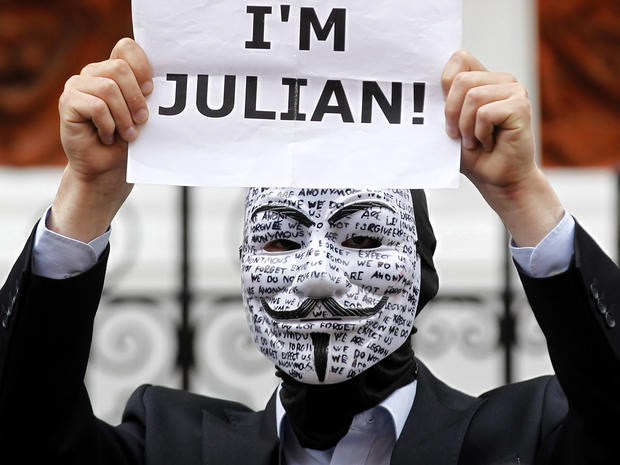WikiLeaks' Assange a prisoner of his own making
(CBS News) LONDON - He may be living in one of the poshest parts of London, but Julian Assange remains confined inside, a prisoner of his own making.
Senior diplomatic sources told CBS News the WikiLeaks founder has been granted permission to remain indefinitely at the Ecuadorean Embassy in London "until a diplomatic solution can be reached."
They hesitated to use the word "welcome."
Special Section: WikiLeaks
Assange boosts Ecuador leader's anti-U.S. cred
U.K.: WikiLeaks' Assange won't be allowed to leave
Assange has been holed up in the embassy since seeking refuge June 30.
On Thursday, the Latin American country granted Assange "diplomatic asylum," but the British government has repeated the threat that if Assange steps one foot off embassy grounds he will be arrested and extradited to Sweden.
"Diplomatic" rather than "political" asylum seems a small change, but it's an important one.
British Foreign Secretary William Hague has insisted that Britain does not recognize the status of diplomatic asylum, nor is it an internationally accepted means of granting refuge.
Embassy officials say no plan has been drawn up to assist Assange in getting past police officers to a plane out of Britain.
The diplomatic sources told CBS News the main sticking point to negotiations is third-country extradition.
Swedish police want to question Assange in Sweden over sexual assault allegations.
Ecuadorean officials said there have been no assurances by the Swedes that Assange won't then be bundled off and handed to the U.S., where his secret-spilling WikiLeaks has caused outrage in Washington.
Embassy officials said they have repeatedly offered Swedish investigators opportunities to question Assange at the embassy, but those offers have been turned down.
Relations between Ecuador and Britain hit a new low this week after the British Foreign Office sent a note reminding Ecuador of a little-known 1987 law that gives the U.K. the right to revoke embassy status, thus enabling officers to enter the embassy to arrest Assange.
The diplomatic sources said after the note was delivered to officials in the Ecuadorean capital Quito, "60 British police officers swarmed and surrounded the embassy." Every door and window was guarded. One source said it felt like the building was under siege.
Hague has since tried to downplay that threat, saying no plans were under way to storm the embassy and arrest Assange by force.
The police presence around the embassy, while still round-the-clock, has decreased considerably since.

